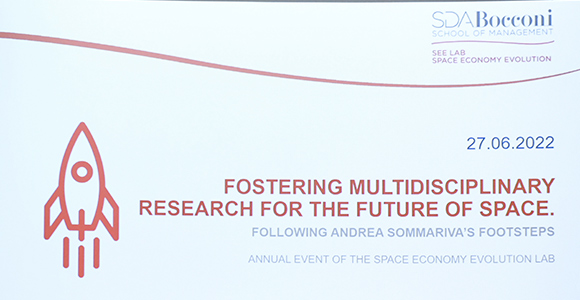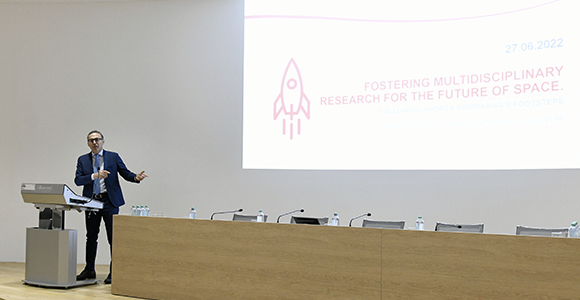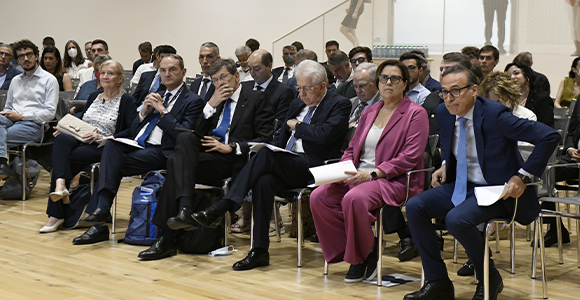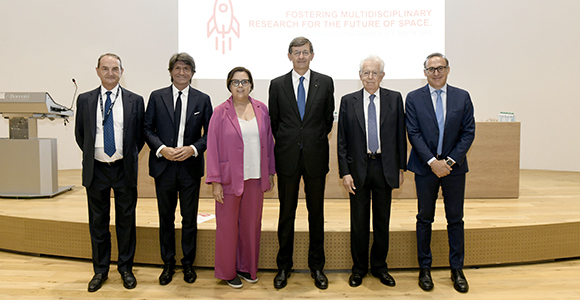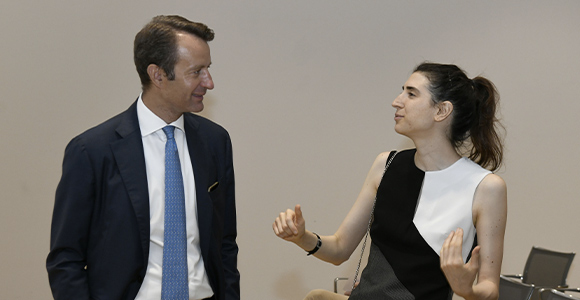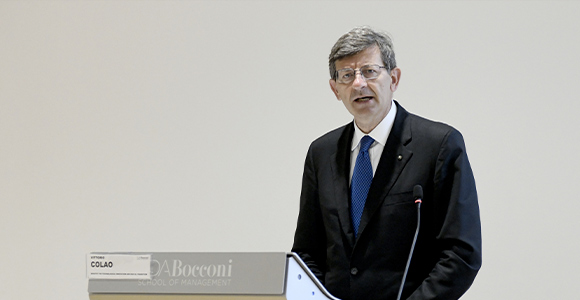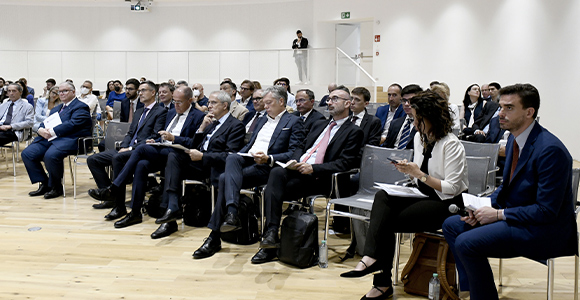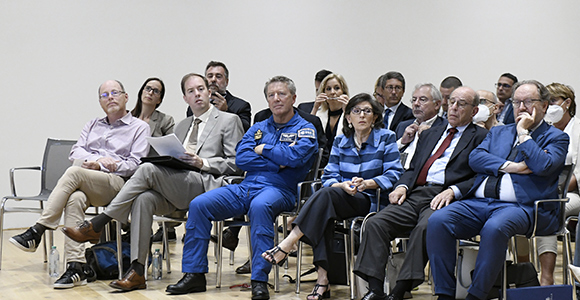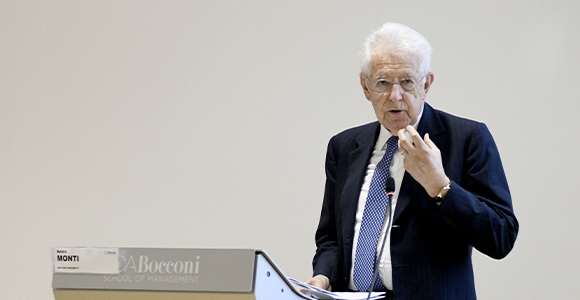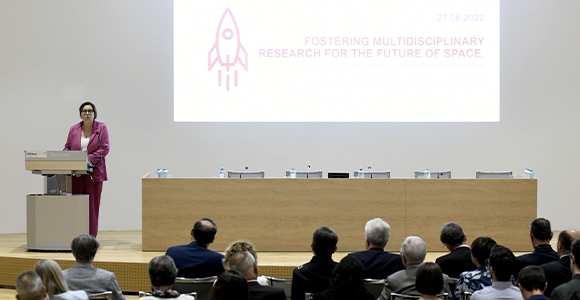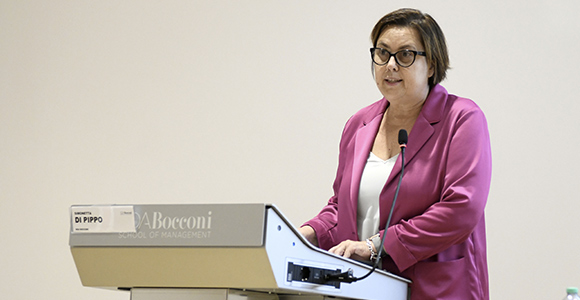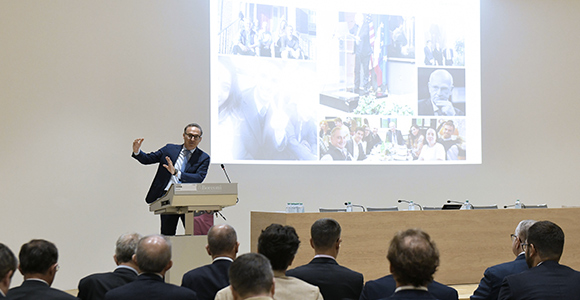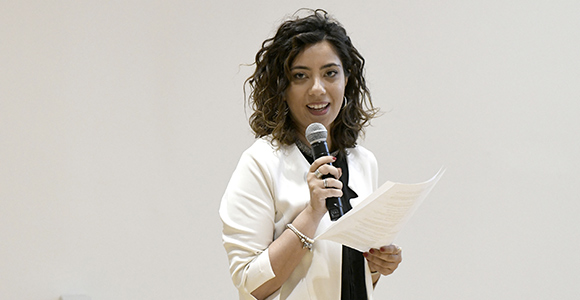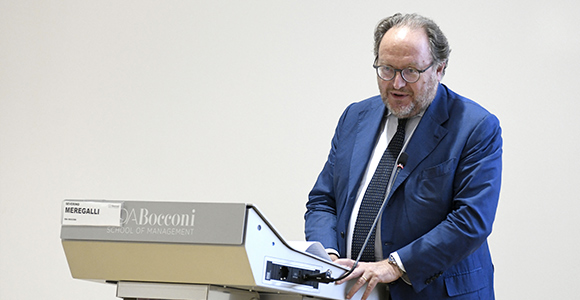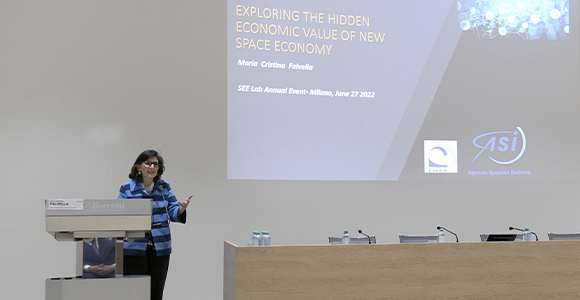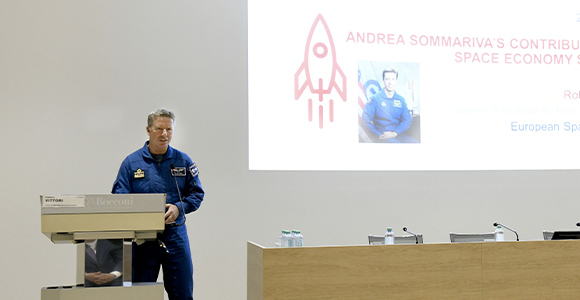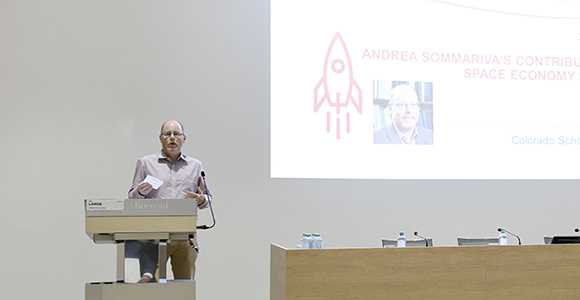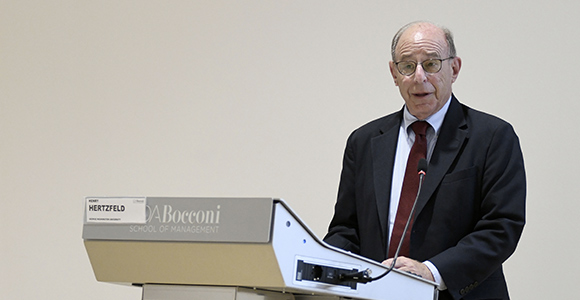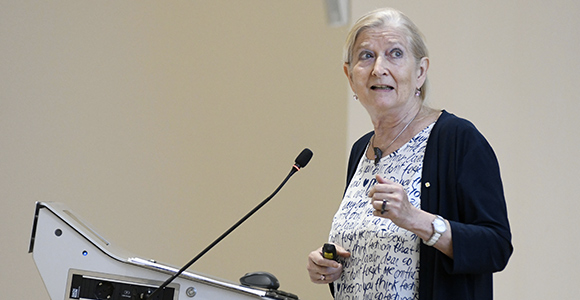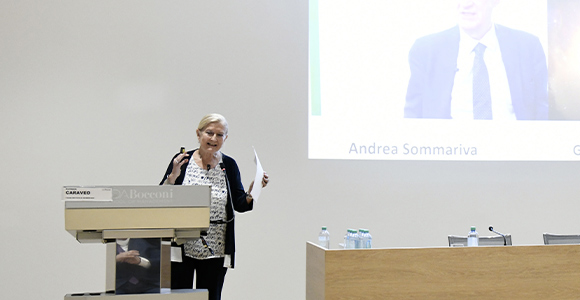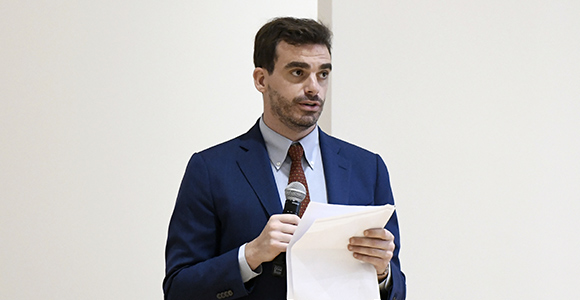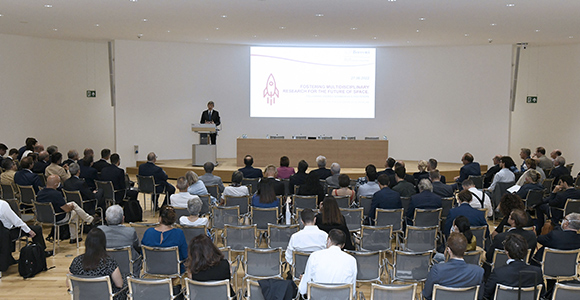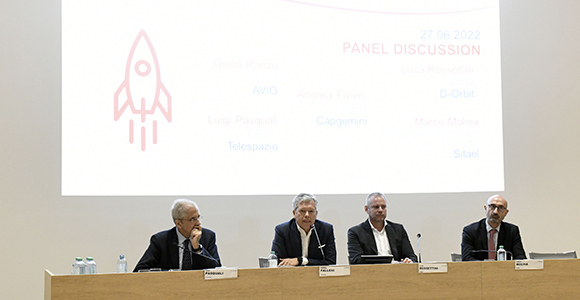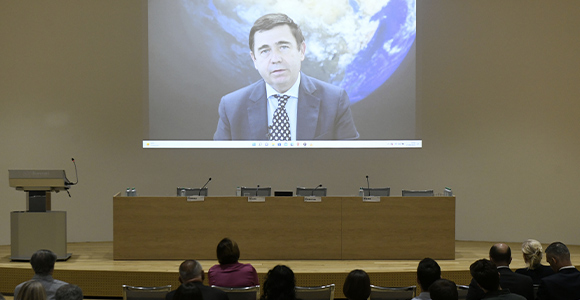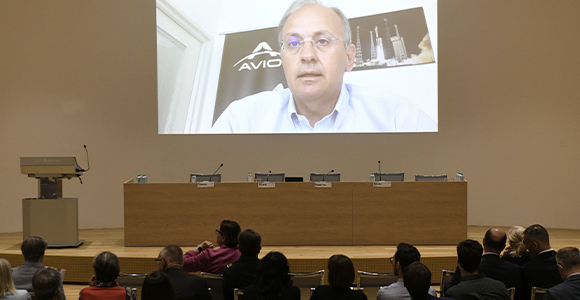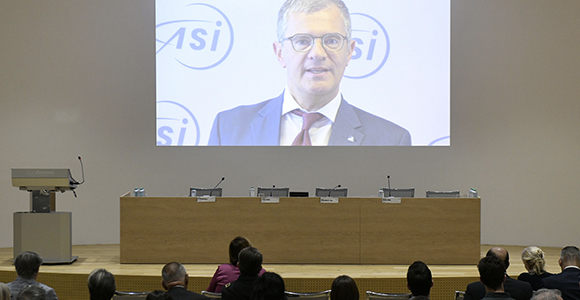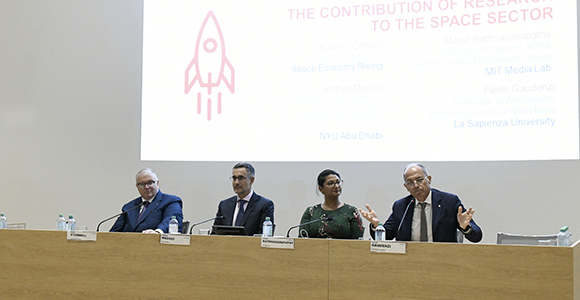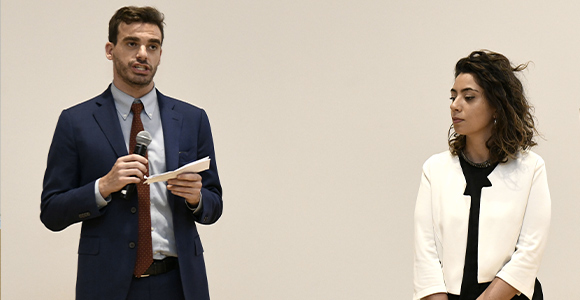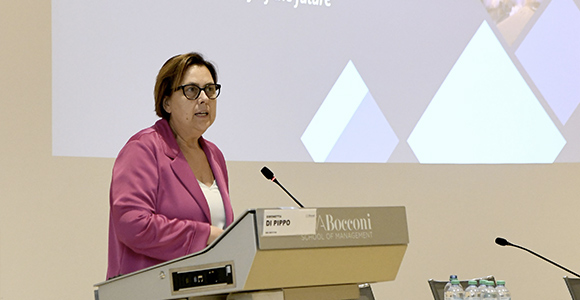Fostering Multidisciplinary Research for the Future of Space. Following Andrea Sommariva’s Footsteps
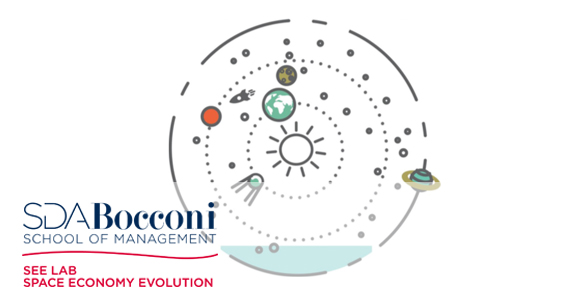
27th June 2022
SDA Bocconi - Milan
On June 27th, 2022 the Space Economy Evolution Laboratory of SDA Bocconi (SEE Lab) hosted its Annual Conference, titled “Fostering Multidisciplinary Research for the Future of Space. Following Andrea Sommariva’s Footsteps”. Guest speakers from both the Academia and the business sector were invited, delivering insightful speeches on the theme of multidisciplinarity and on the research-industry relationships that can foster the future of space economy.
After the greeting remarks made by SDA Bocconi’s Dean Giuseppe Soda, the SEE Lab’s Director Simonetta Di Pippo opened up the Conference by describing the activities that the Laboratory carried on in the past and its perspectives for the future. In her view, space is a fundamental tool to foster socioeconomic sustainable growth at the global level, and with the same importance in developed and developing countries. The SEE Lab is at the forefront to promote an economic viewpoint on the space topics, hence, to implement multidisciplinarity of research in this specific context.
Bocconi University President Mario Monti took then the stage, delivering a wide, all-encompassing speech on the current and future role of space on the global scenario. In President Monti’s view, space is a strategic field for governments all across the world since it bears a strong diplomatic value: there can be no evolution without diplomacy and collaboration. Nowadays, with the Ukraine-Russia crisis and its consequent disruptions, the world is indeed witnessing how important is to have strong and healthy relationships between nations. Space and space economy can thus play a role for multilateral collaboration, becoming a pillar on which to base present and future governments’ relationships. Importantly enough, the planification and strategy needed to foster the space sector’s development require by nature a long-term view ability by policymakers. As regards Italy, Government was indeed represented in the Conference thanks to the presence of the Minister for Technological Innovation and Digital Transition, Vittorio Colao. Minister Colao reaffirmed the solidity of the Italian space industry, and also the contribution that Italy can give to the global sector. With around EUR 2bn revenues last year and the specific expertise that characterizes Italian workers in the sector, mainly in the Earth Observation, space transportation and exploration branches, space industry can be a pillar for future industrial development in the country. Earth Observation and the overall downstream domain will indeed be supported by the Italian government and national authorities, as the recent policy decisions regarding the PNRR investments and the IRIDE project show. Alongside opportunities, Minister Colao cited that the space industry also needs to acknowledge and address three main challenges to its present and future expansion: to build a global-wide cooperation framework, to disseminate knowledge regarding space matters, applications and opportunities, and to build up shared governance practices to foster policy coordination.
Next, the Conference came to the memorial moment of the SEE Lab’s founder, Professor Andrea Sommariva. Speakers focused on the challenges and insights that the Professor was able to face and indicate; all of them still guide our research route and method.
As a first note, INAF’s Research Director Patrizia Caraveo traced the SEE Lab’s origin and first developments by describing the personal and professional relationship between Prof. Sommariva and Prof. Bignami. Their common view, a combination of science, technology, finance and management expertise, was the right mix to develop the space sector in a business perspective. Later, Director Caraveo focused on the importance of space science in all developments that attain to space economy, mainly on the technological advancement that can often be of very successful application in the business field.
A close, but different focus was instead presented by Henry Hertzfeld, Professor of Space Policy and International Affairs at the George Washington University. Prof. Hertzfeld touched the theme of socioeconomic benefits related to space activities. In particular, space operations can have a strong impact both at a micro and a macro level in business terms: on the micro side, the simplest example is the possibility to use space data for business management and decision making; on the macro side, space services can offer a boost for growth in a very wide range of traditional economic sectors, hence they should gather attention from governments and governing bodies in general. The role of space researchers, in this sense, is to focus on present social and economic challenges so to provide a support for well-informed policies; some of these challenges include the climate issue, the Space Solar Power project and research on productivity-enhancement strategies developed through space services.
Ian Christensen, Director of Private Sector Programs at the Secure World Foundation, shared memories of his relationship with Prof. Sommariva, reminding his optimism and his fascination for the space economy. Then, he focused on the most pressing (current) challenges to create a wider and stronger cooperation framework between private and public entities through cooperative dialogues, PPP schemes and development of policy options to promote the sustainability of the orbital environment. These purposes would stand on a multidisciplinary thinking, resulting in multi-stakeholder discussions, which is the real strength of the SWF-SEE Lab collaboration.
Multidisciplinarity was also the theme of Ian Lange’s speech, Associate Professor of Economics and Business at the Colorado School of Mines. After having remembered his relationship with Prof. Sommariva, describing him as a forerunner on a number of themes like the lunar economy, Prof. Lange presented the close collaboration between the Colorado School of Mines and the SEE Lab, the fuel of which has been the mix of expertise between technical/scientific knowledge and economic research, both equally important to develop effectful as well as feasible projects.
Roberto Vittori, General of the Italian Air Force and former astronaut at European Space Agency, shared with the public a vivid memory of the first time he met Prof. Sommariva. Reminding his conversation with him, he mentioned how he appreciated Sommariva’s cutting-edge approach of studying space-related socio-economic phenomena.
Maria Cristina Falvella, President at Fondazione Amaldi and General Inspector at the Italian Space Agency, took from Prof. Hertzfeld and reiterated the increasing importance that both professionals and researchers may pose on the study of socioeconomic impacts related to space activities. The commercial exploitation of space assets should be the route through which to favor the space sector’s expansion, but such commercial exploitation can flourish only if the expected benefits are clear. Since governments are the main investors and stakeholders in the sector, a first push might come from strategic policies aimed at the enhancement of space activities’ macroeconomic impact. Still, the private sector is expected to gain more and more importance in the years to come, concretely creating and developing the so-called New Space Economy.
Severino Meregalli, Associate Professor of Practice at SDA Bocconi School of Management, concluded the panel with his speech. He provided some memories about Prof. Sommariva and shared some lessons learnt from him, such as the importance of applying research for the improvement of real-world situations – in opposition to the view of conducting research only for publication purposes.
Some other perspective was cited by the Founder and CEO of Space Economy Rising, Kevin O’Connell, who opened the second panel of discussion. His speech shifted the attention on the need to make non-space industries and companies aware of the possibilities that space applications are able to offer. The connection with entities that currently have small to zero acknowledgement of space assets’ capabilities is indeed possible and can be accelerated by the employment of already-existing expertise in space companies’ management, such as technical and talented entrepreneurship, professional multidisciplinarity, common schemes for public-private collaboration and a well-structured regulatory framework built on the basis of best practices and data collection.
But space is not only a Europe-US matter. In this regard Andrea Macciò, Director of the Center for Astro, Particle and Planetary Physics and Associate Professor of Physics at the New York University – Abu Dhabi, presented an overview of the Center’s activities, which are focused on the scientific side of space research. As done by Prof. Lange, Prof. Macciò highlighted that the collaboration with the SEE Lab is particularly important to integrate scientific knowledge to business expertise, and vice versa. The combination of the two is essential in regard of space economy, with one between the major examples being the European Square Kilometer Consortium (ESKAC).
Following Professor Macciò’s remarks, the Research Engineer at the Space Enabled Research Group of MIT Media Lab Minoo Rathnasabapathy focused on the concepts of entrepreneurship and sustainability applied to space. Indeed, entrepreneurial capabilities and innovation are key elements for the current space sector growth, in her view. Still, in its development, the sector must pay attention to grow sustainably, both from an environmental and an economic point of view. The applicability of the same space-based services in space and on Earth may help this process to develop under control.
The first part of the Conference terminated with the contribution of Paolo Gaudenzi, Professor of Aerospace Structures and Constructions at La Sapienza University. In his speech, Prof. Gaudenzi defined the recent space-related dynamics to represent a change of paradigm, in which is strongly necessary to let the younger, talented professional and researchers to freely think and propose innovations, since young brains do not know the “limits” of what is possible.
Entering its second part, the Conference switched to a panel discussion of some prominent CEOs from the aerospace industry. The President of the Italian Space Agency Giorgio Saccoccia introduced the session remotely and citing that there exists no space activity without research. Furthermore, he cited that the same growth of the space industry heavily relies on the academic and scientific research developments: hence, innovation and entrepreneurship are key elements to keep into consideration even from the Universities’ and/or research centers’ points of view.
Also Giulio Ranzo, chief executive of AVIO, kindly left a recording in which he brought the importance of sustainability to the audience’ attention, bringing as an example AVIO’s development of natural gas engines, which are much more economic and efficient than standard ones. Any and each example of a new application, idea or service is of interest since it opens routes for further investigation and, possibly, innovation.
Similarly, Massimo Comparini, CEO of Thales Alenia Space, highlighted the disruptive force of multidisciplinarity in research, citing that new space infrastructures or services have always come up from a multidisciplinary approach, in all domains. Some examples attain to the opportunities that microgravity in LEO offers to pharma and medical research, biotech and many others: applied research in these fields is the proof that the collaboration between space and non-space industries is fuel for future expansion.
Telespazio’s CEO Luigi Pasquali, then, stressed how the space sector has the main role of introducing new technologies, including but not limited to the digital ecosystem and digital transformation fields. Such innovations are a push to lower barriers between traditional, industrial sectors, creating the opportunity to develop new business models. In this sense, a multidisciplinary approach to space research is of fundamental importance. Telespazio’s strong collaboration with SDA Bocconi and the SEE Lab has tried to develop such kind of approach by promoting research activities, knowledge dissemination events and training camps.
Instead, Andrea Falleni, CEO of Capgemini, focused his contribution on the theme of data. Data production and management is a topic in which space technologies play an outstanding role, given their generation capabilities. Nowadays, data quality and data consistency are essential to any decision maker: as also highlighted by previous speakers, to guarantee a beneficial development of space services in the realm of data, researchers and professionals need to address the challenges of cooperation, competencies’ dissemination and unified governance.
And on governance and regulation indeed focused Luca Rossettini, CEO of D-Orbit, who started his contribution with a strong comparison between the current state of the space economy environment and the Old Wild West, referring to the lack of regulations. After that, he gave his personal insight on how research activities should develop from now on, pointing to a wider collaboration that starts from universities and research labs and finally reaches companies to propose new commercial opportunities.
As a final note, the Managing Director of Sitael Marco Molina warned on the fragility of the space ecosystem as it is now: the contributions of research, governance and of economic sustainability studies must contribute to an enhanced robustness of the sector overall. In his view, sustainability is directly linked to younger generations’ leadership, able to foster disruptive innovation in the industry.
In conclusion, the Conference testified the great interest around space and space economy matters. Such interest pervades both the academic world, from the two viewpoints of scientific/technical research and economic/business research, and the commercial arena. Hence, the near-term goal now becomes to concretize the intentions expressed throughout the Conference into impactful projects, collaborations and partnerships for the successful development of the space industry and of the space economy.


